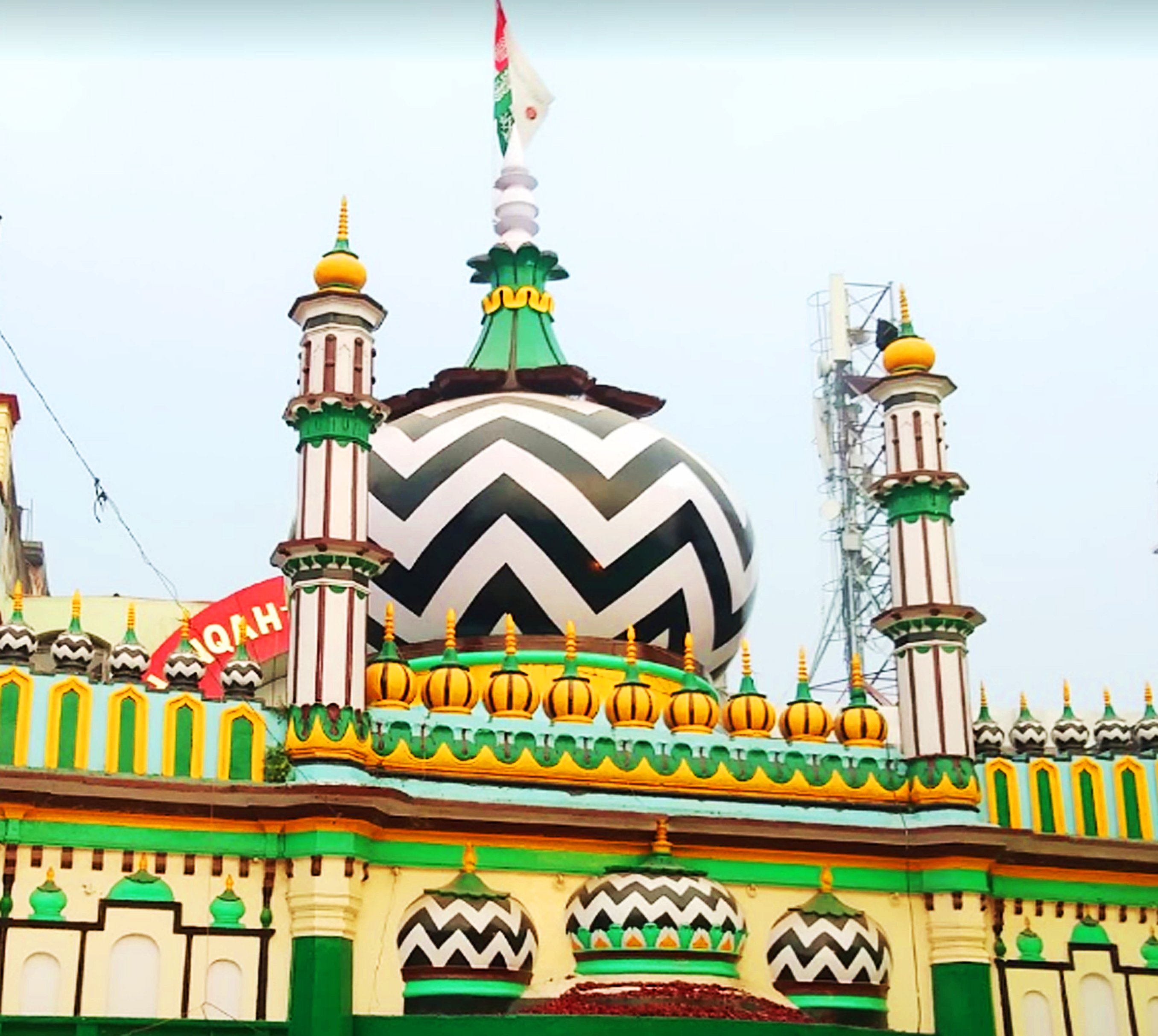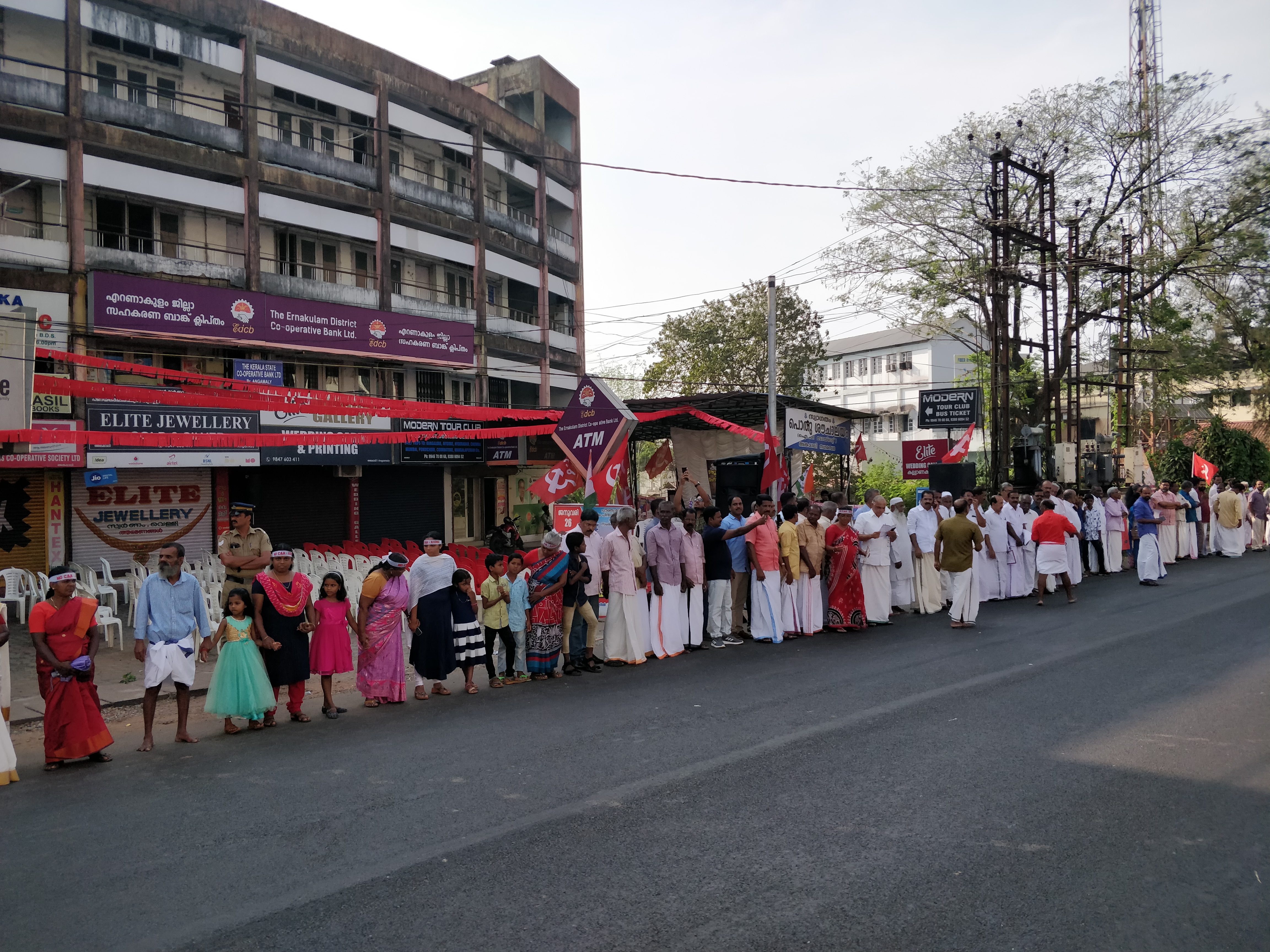|
Jama'at Raza-e-Mustafa
Jamat Raza-e-Mustafa (, ) also known as JRM, is a historical organisation of Indian Sunni Barelvi Muslims associated with Sufism. It was founded by scholar and 19th-century Mujadid Ahmed Raza Khan Barelvi on 17 December 1920 in Bareilly, India, to propagate Islamic teachings in accordance with Ahle Sunnah wal Jama'ah. The self-described aim of the group is to "deny misguided sects and safeguard the beliefs (Aqaa'id) of the Ahle Sunnah wal Jama'ah."Jackson, William Kesler (2013), p. 189. History It played a significant role during Shuddhi movement which was initiated by Arya Samaj to convert Muslims into Hinduism. The Jamat Raza-e-Mustafa prevented around four hundred thousand re-conversions to Hinduism in eastern U.P and Rajasthan during its activities under anti-Shuddhi movement. In 1917, Allama Naeem-ud-Deen Muradabadi organized the historical Jamat Raza-e-Mustafa conference at Jamia Naeemia Moradabad, a group whose mission was to curb, and if possible reverse, the tide of ... [...More Info...] [...Related Items...] OR: [Wikipedia] [Google] [Baidu] |
Ahmed Raza Khan
Ahmad Raza Khan Baraylawi (14 June 1856–28 October 1921), known reverentially as A'la Hazrat, (Grand Master), was an Islamic scholar, mufti, polymath, gnostic, poet from (undivided) India, he is considered as the founder of the Barelvi movement by his rivals. Born in Bareilly, British India, Ahmad Raza Khan wrote on law, religion, philosophy and the sciences, and because he mastered many subjects in both rational and religious sciences he has been called a polymath by Francis Robinson, a leading Western historian and academic who specializes in the history of South Asia and Islam. As well as D. B. Hann. He himself states he mastered over 55 branches of knowledge which he also lists out. He was an Islamic scholar who wrote extensively in defense of the status of Muhammad in Islam and popular Sufi practices. He himself says in a religious authorisation letter which he wrote to another scholar that the most beloved thing to him was the "''defence of my Master, the Chief ... [...More Info...] [...Related Items...] OR: [Wikipedia] [Google] [Baidu] |
Barelvi Movement
The Barelvi movement, also known as Ahl al-Sunnah wal-Jama'ah (People of the Prophet's Way and the Community) is a Sunni revivalist movement that generally adheres to the Hanafi school, Hanafi and Shafi'i school, Shafi'i schools of jurisprudence, the Maturidism, Maturidi and Ash'arism, Ash'ari Aqidah, creeds, a variety of Sufi orders, including the Qadiri, Chisti, Chishti, Naqshbandi and Suhrawardiyya, Suhrawardi orders, as well as many other orders of Sufism, and has hundreds of millions of followers across the world. They consider themselves to be the continuation of Sunni Islamic orthodoxy before the rise of Salafism and the Deobandi movement. The Barelvi movement is spread across the globe with millions of followers, thousands of mosques, institutions, and organizations in India, Pakistan, Bangladesh, Afghanistan, Sri Lanka, the United Kingdom, South Africa and other parts of Africa, Europe, the Caribbean, and the United States. As of 2000, the movement had around 200 mil ... [...More Info...] [...Related Items...] OR: [Wikipedia] [Google] [Baidu] |
Yogi Adityanath
Yogi Adityanath (born Ajay Mohan Singh Bisht; 5 June 1972) is an Indian Hindu monk and politician. He is currently serving as the chief minister of Uttar Pradesh since 19 March 2017, became the first to hold the office for two consecutive terms and the state's longest-serving chief minister in a single continuous tenure. Previously, Adityanath served as a member of India's parliament for almost two decades, from 1998 until 2017. At the age of 26, he became one of the youngest Indian parliamentarians in 1998 and went on to win the next five consecutive terms from Gorakhpur Lok Sabha constituency. In 2017, he moved from central to the UP state politics and was elected as the chief minister of Uttar Pradesh. Initially, in 2017, he became a member of the UP legislative council. Subsequently, in 2022, he became a member of the state legislative assembly, having won the election from Gorakhpur Urban Assembly constituency. Adityanath is also the '' mahant'' (head priest) of the ... [...More Info...] [...Related Items...] OR: [Wikipedia] [Google] [Baidu] |
Ram Nath Kovind
Ram Nath Kovind ( ; born 1 October 1945) is an Indian politician and lawyer who served as the president of India from 2017 to 2022. He is the first person from Uttar Pradesh to serve as the president. He is a member of the Bharatiya Janata Party (BJP) and also the first person from the party to become the president. Prior to his presidency, he served as the Governor of Bihar from 2015 to 2017. He also served as a Member of Rajya Sabha from 1994 to 2006. Before entering politics, he was a lawyer for 16 years and practiced in the Delhi High Court and the Supreme Court of India until 1993. Early life and education Kovind was born to Maiku Lal and Kalawati in a Koli family during the British Raj on 1 October 1945, in Paraunkh village in the Kanpur Dehat district of Uttar Pradesh, as the youngest of five brothers and two sisters. His father Maikulal ran a shop and was also a farmer and a local vaidya (doctor). His mother Kalawati was a homemaker. Kovind was born in a mud hut, ... [...More Info...] [...Related Items...] OR: [Wikipedia] [Google] [Baidu] |
Citizenship (Amendment) Act, 2019
The Citizenship (Amendment) Act, 2019 (CAA) was passed by the Parliament of India on 11 December 2019. It amended the Citizenship Act, 1955 by providing an accelerated pathway to Indian citizenship for persecuted refugees of religious minorities from Islamic countries Afghanistan, Bangladesh and Pakistan who arrived in India by 2014. The eligible minorities were stated as Hindus, Sikhs, Buddhists, Jains, Parsis or Christians.Citizenship Amendment Bill: India's new 'anti-Muslim' law explained , BBC News, 11 December 2019. The law does not grant such eligibility to from these Islamic countries. [...More Info...] [...Related Items...] OR: [Wikipedia] [Google] [Baidu] |
Jamiat Ulema-e-Hind
Jamiat Ulema-e-Hind or Jamiat Ulama-i-Hind ( ) is one of the leading organizations of Islamic scholars belonging to the Deobandi school of thought in India. It was founded in November 1919 by a group of Muslim scholars including Abdul Bari Firangi Mahali, Kifayatullah Dehlawi, Muhammad Ibrahim Mir Sialkoti and Sanaullah Amritsari. The Jamiat was an active participant in the Khilafat Movement in collaboration with the Indian National Congress. It also opposed the partition of India, taking the position of composite nationalism: that Muslims and non-Muslims form one nation. As a result, this organisation had a small break-away faction known as the Jamiat Ulema-e-Islam, which decided to support the Pakistan movement. The constitution of the Jamiat was drafted by Kifayatullah Dehlawi. As of 2021, it is spread over various states of India and has established institutions and wings such as the Idara Mabahith-e-Fiqhiyyah, the Jamiat National Open School, the Jamiat Ulama-e-Hind ... [...More Info...] [...Related Items...] OR: [Wikipedia] [Google] [Baidu] |
Mustafa Raza Khan
Mustafa Raza Khan Qadri (1892–1981), was an Indian Sunni Muslim scholar and author, and leader of the Sunni Barelvi movement following the death of its founder, his father Ahmed Raza Khan. He was known as ''Mufti-Azam-i-Hind'' to his followers. He is widely known as ''Mufti-e-Azam-e-Hind''. On his death date his follower celebrate Urs name as Urs-e-Noori on every 14th Muharram of Islamic Year. Lineage Life He wrote books on Islam in Arabic, Urdu, Persian, and announced judgments on several thousand Islamic problems in his compilation of fatawa ''Fatawa-e-Mustafwia''. Thousands of Islamic scholars were counted as his spiritual successors. He was the main leader of the Jama'at Raza-e-Mustafa in Bareilly, which opposed the Shuddhi movement to convert Muslims to Hinduism in pre-Partition India. During the time of emergency in 1977 in India, he issued a fatwa against vasectomy which was made compulsory and 6.2 million Indian men were sterilized in just a year. I ... [...More Info...] [...Related Items...] OR: [Wikipedia] [Google] [Baidu] |
Jamia Naeemia Moradabad
Jamia Naeemia Moradabad (, ) is an Islamic seminary in India. It is located in Moradabad in the northern state of Uttar Pradesh. The seminary is a major center of the Barelvi movement in India and has been the target of violence by the rival Deobandi movement. History It started off as a madrasa in the town of Moradabad. It was named 'Naeemia' after the name of Naeem-ud-Deen Muradabadi, a Sunni Islamic scholar. It has produced several leading ulemas of Sunni Sufi movement. In 1925 (1343H), an All India Sunni Conference’s first summit was organised at Jamia Naeemia Moradabad, whose aims included the unification of "the Sunni majority" under a single political, economic, and socio-religious platform. It was attended by the more than two hundred and fifty religious scholars. Sajjada-nashin of Dargah Syed Ashraf Jahangir Semnani, Syed Mohammad Izhar Ashraf taught at Jamia Naeemia Moradabad Courses * Dars e Nizami *Alim *Fazil Fatwas The Darul Ifta Jamia Naeemia Moradabad i ... [...More Info...] [...Related Items...] OR: [Wikipedia] [Google] [Baidu] |
Naeem-ud-Deen Muradabadi
Syed Naeem-ud-Deen Muradabadi (1887–1948), also known as ''Sadr ul-Afazil'', was an Indian jurist, scholar, mufti, Quranic exegete, and educator. He was a scholar of philosophy, geometry, logic and hadith and leader of All India Sunni Conference. He was also a poet of na`at. Early life He was born on 1 January 1887 (21 Safar 1300 AH) in Moradabad, India to Mu'in al-Din. His family originally came from Mash'had, Iran. Sometime during the rule of King Aurangzeb, they travelled from Iran to India, where they received a land grant from the ruling monarchy. They eventually reached Lahore and settled near Abul-Hasanat'. Muradabadi memorised the Qur'an by the age of 8. He studied Urdu and Persian literature with his father and studied Dars-i Nizami with Shah Fadl Ahmad. He subsequently earned a degree in religious law from Shah Muhammad Gul and pledged allegiance to him. Religious activities Naeemudin wrote in defense of Prophet Muhammad’s knowledge of the unseen, in addition ... [...More Info...] [...Related Items...] OR: [Wikipedia] [Google] [Baidu] |
Shuddhi (Hinduism)
Shuddhi (Sanskrit: शुद्धि ''śuddhi'', Hindi: शुद्धि ''śuddhi'', Punjabi: ਸ਼ੁੱਧ ''śuddh'') is a Sanskrit word meaning purification or cleansing. In the context of modern Hinduism, it describes a Hindu religious movement started by Arya Samaj, initially aimed at re-converting former Hindus who departed the religion for Christianity or Islam, but later expanded to convert non-Hindus altogether. This term is also present in some medieval smritis, as well as in later Sikh literature, also in the context of re-conversion. Etymology Shuddhi is derived from the Sanskrit word शुद्धि ''śuddhi'' ("purified"), the past passive participle of the verb शुध् ''śudh'' ("to purify"). This word ultimately derives from Proto-Indo-European *(s)ḱew- ("to shine"). Although the Sanskrit word शुद्धि was inherited into Hindi as सुध ''sudh'' and into Punjabi as ਸੁੱਧ ''suddh'', both inherited words are generic ... [...More Info...] [...Related Items...] OR: [Wikipedia] [Google] [Baidu] |
Ahmed Raza Khan Barelvi
Ahmad Raza Khan Baraylawi (14 June 1856–28 October 1921), known reverentially as A'la Hazrat, (Grand Master), was an Islamic scholar, mufti, polymath, gnostic, poet from (undivided) India, he is considered as the founder of the Barelvi movement by his rivals. Born in Bareilly, British India, Ahmad Raza Khan wrote on law, religion, philosophy and the sciences, and because he mastered many subjects in both rational and religious sciences he has been called a polymath by Francis Robinson, a leading Western historian and academic who specializes in the history of South Asia and Islam. As well as D. B. Hann. He himself states he mastered over 55 branches of knowledge which he also lists out. He was an Islamic scholar who wrote extensively in defense of the status of Muhammad in Islam and popular Sufi practices. He himself says in a religious authorisation letter which he wrote to another scholar that the most beloved thing to him was the "''defence of my Master, the Chief ... [...More Info...] [...Related Items...] OR: [Wikipedia] [Google] [Baidu] |



